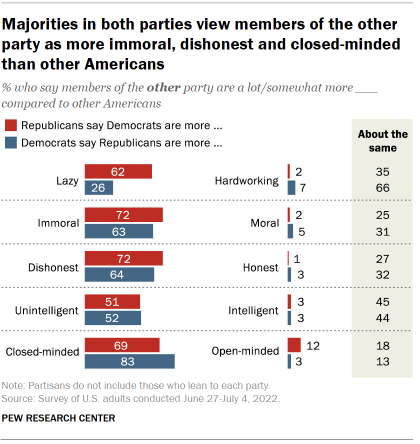
Increasing shares of Republicans and Democrats ascribe several negative traits to members of the other party. And there is a similar pattern in views among those who lean toward the parties but do not identify as Republicans or Democrats.
There also has been a rise in the shares in both parties who describe their co-partisans in positive terms – saying they are more moral, open-minded and honest than other Americans.
On several traits, majorities of both Republicans and Democrats attribute negative stereotypes to members of the opposing party: An overwhelming majority of Democrats (83%) say Republicans are a lot or somewhat more closed-minded than other Americans, while nearly seven-in-ten Republicans (69%) say the same about Democrats.
Nearly three-quarters of Republicans say Democrats are more immoral (72%) than other Americans, while an identical share (72%) say Democrats are more dishonest. Smaller majorities of Democrats characterize Republicans as more immoral (63%) or more dishonest (64%).
About half of Republicans (51%) and Democrats (52%) say that members of the other party are more unintelligent compared with other Americans.
The widest imbalance in partisans’ views of their opponents is on whether those in the other party are viewed as lazier than other Americans. About six-in-ten (62%) Republicans say Democrats are more lazy than other Americans. By contrast, only about a quarter of Democrats (26%) describe Republicans as lazier than others.
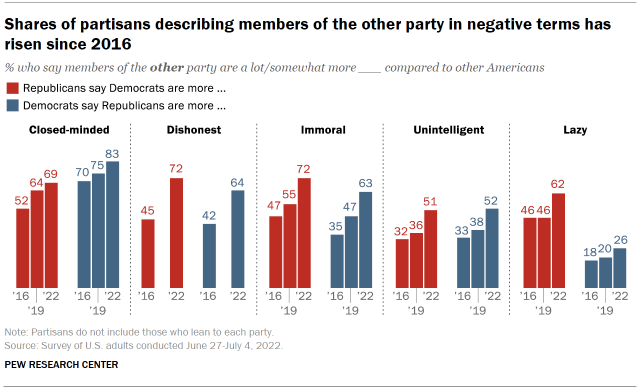
The shares of Republicans and Democrats describing members of the other party with these negative traits has risen since 2016, when Pew Research Center first asked this set of questions.
There has been a particularly pronounced increase in the shares of partisans describing members of the other party as immoral over the past six years. In 2016, 47% of Republicans and 35% of Democrats said members of the other party were more immoral than other Americans; that increased to 55% and 47%, respectively, in 2019. Today, majorities in both parties (72% of Republicans, 63% of Democrats) view members of the opposing party as more immoral. The shares describing members of the other party as more dishonest have grown by a similar degree over the last six years.
Since 2016, there also have been sizable increases in the shares of both Republicans and Democrats who describe members of the other party as more closed-minded and unintelligent than other Americans.
Republicans also are increasingly likely to characterize Democrats as lazier than other Americans. A majority of Republicans (62%) say Democrats are more lazy than other Americans, up from 46% in 2019 and 2016. About a quarter of Democrats (26%) say the same about Republicans, which is a modest 8 percentage point increase since 2016.
Leaners hold fewer negative stereotypes about the other party than partisans, but rising shares attribute negative traits
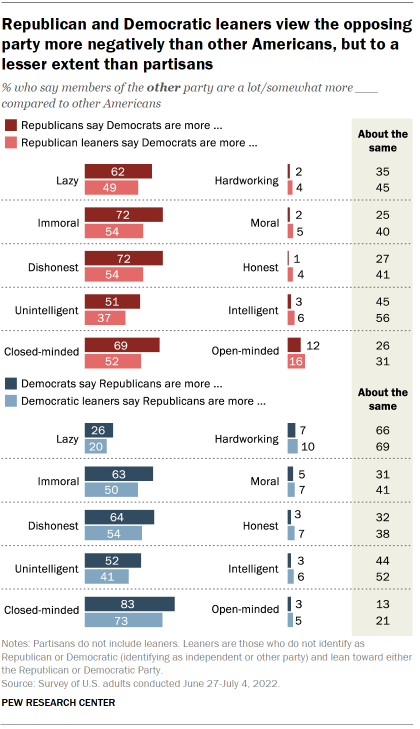
People who lean toward a party hold fewer positive stereotypes about members of that party than do those who affiliate with it. They also hold fewer negative stereotypes of members of the opposing party than do partisans.
For example, while 72% of Republicans say Democrats are more immoral than most Americans and an identical share say they are more dishonest, those shares drop to 54% among Republican-leaning independents.
Similarly, about half of Republican leaners describe Democrats as more lazy (49%) or closed-minded (52%) than other Americans (compared with 62% and 69% of Republican partisans, respectively).
While a large majority of Democratic leaners (73%) describe Republicans as closed-minded, those who identify as Democrats are even more likely to say this about Republicans (83%). And at least half of Democratic leaners describe Republicans as more dishonest (54%) and immoral (50%) than other Americans, compared with 64% and 63% of Democratic partisans, respectively. Relatively low shares of both Democrats (26%) and Democratic leaners (20%) say Republicans are more lazy than other Americans.
Just as partisans have become more negative toward those in the other party, so too have partisan leaners. Those who lean to the Republican and Democratic parties are more likely to describe those in the opposing party as more immoral, closed-minded, unintelligent, dishonest and lazy than they were in 2016.
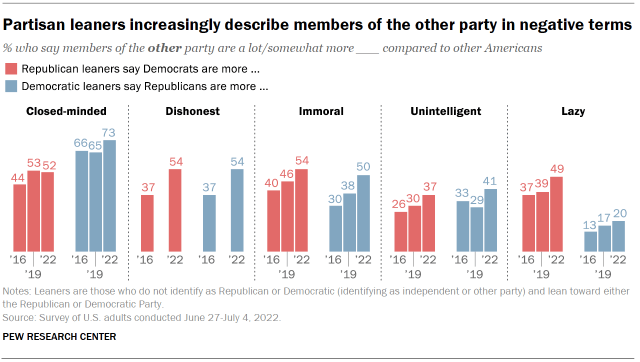
Most Democrats view those in their party as more open-minded than other Americans; most GOP see co-partisans as more hardworking
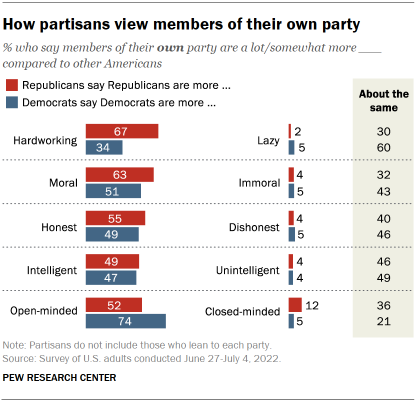
Large shares of Democrats and Republicans associate their fellow partisans with positive traits in a pattern generally opposite of how they view the other party’s members.
Two-thirds of Republicans say that Republicans are more hardworking compared with other Americans. Democrats are considerably less likely to describe Democrats in this way: About a third (34%) say Democrats are more hardworking than other Americans, while 60% say they are about the same.
However, Democrats are substantially more likely than Republicans to characterize members of their own party as open-minded. While nearly three-quarters of Democrats (74%) describe other Democrats as more open-minded, about half of Republicans (52%) say the same about Republicans.
Roughly half of Democrats say Democrats are more moral (51%), honest (49%) and intelligent (47%) than other Americans. Larger shares of Republicans say that Republicans are more moral (63%) and honest (55%), while about the same share say they are more intelligent (49%).
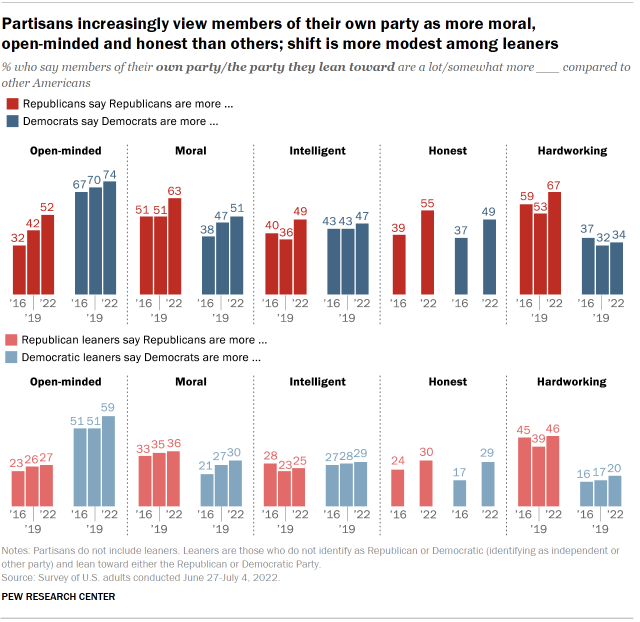
Republicans and Democrats increasingly associate their fellow partisans with positive traits.
The share of Republicans who say that Republicans are more moral than others has increased over the past six years. In 2016 and 2019, about half of Republicans (51%) said Republicans were moral than other Americans; today, 63% say this. The share of Democrats who say their co-partisans are more moral has increased from 38% in 2016 to 47% in 2019 and 51% in the current survey.
Republicans in particular are more likely to view members of their party as more open-minded than they were a few years ago. Since 2016, there has been a 20-point increase in the share of Republicans who say members of the GOP are more open-minded than other Americans (from 32% to 52%). There has been less change among Democrats, who had already widely associated this trait with members of their party; currently, 74% say they are more open-minded than other Americans.
The shares of Republicans and Democrats who see the members of their own party as more intelligent and honest also have risen since 2016. And Republicans, who already viewed their fellow partisans as more hardworking, are now even more likely to say this (67%, compared with 53% in 2019 and 59% in 2016). About a third of Democrats (34%) say members of their party are more hardworking – little changed since 2016, when 37% said this.
Across the board, Republican and Democratic leaners are less likely than partisans to ascribe positive traits to the party they lean toward. And – with a few exceptions – their descriptions of members of the party that they lean toward have remained mostly stable the past few years.
Across the political spectrum, a rise in the number of negative traits attributed to opposing partisans
In both parties, and among both partisans and leaners, the number of negative traits Americans ascribe to members of the opposing party has increased substantially over the past six years. Today, more than half of Republicans (53%) ascribe at least four of the five negative traits asked about in the survey to Democrats, up from 30% six years ago.
Though Democrats are somewhat less likely to ascribe four or more of the five traits to Republicans than Republicans are to Democrats, the share doing so is double what it was in 2016. Today, 43% of Democrats ascribe four or more of these negative traits to Republicans, up from 22% six years ago.
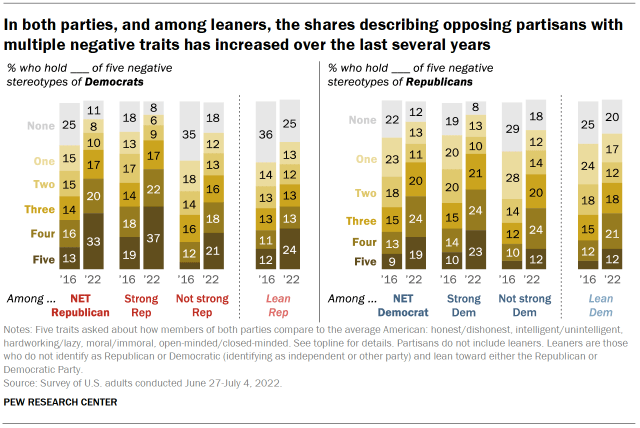
Strong partisans are particularly likely to hold several negative stereotypes of the other party’s members and have become more so since 2016. Today, about six-in-ten strong Republicans (59%) say at least four of the five negative traits apply to Democrats to a greater extent than they do to the average American, up 21 percentage points from 2016. Similarly, while nearly half of strong Democrats (48%) associate four or more negative traits with Republicans today, only about a quarter (26%) did so in 2016.
But while these negative stereotypes are less widely held among those who identify less strongly with the parties – or among independents who lean to each party – the shares of these groups holding more negative stereotypes of those on the “other side” in politics have also grown substantially. Four-in-ten Republicans who do not strongly identify with the GOP, and a similar share of Republican leaners (37%), now associate four or more of the five negative traits with Democrats. By comparison, in 2016, only 16% of not strong Republicans and 23% of Republican leaners did so. The pattern is similar among Democrats. Today, about a third of not strong Democrats (36%) and about a third of Democratic leaners (33%) associate four or more negative traits with Republicans, roughly double the shares (15% and 17%, respectively) who did so in 2016.



